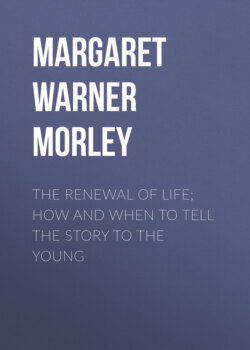Читать книгу The Renewal of Life; How and When to Tell the Story to the Young - Margaret Warner Morley - Страница 11
TELLING THE TRUTH
ОглавлениеShould the mother tell pleasant but totally false stories as to the origin of the child—or should she tell the truth?
It is generally safer to tell the truth. Excepting with very young children the fiction is not long believed, and a course of deception, having been entered upon, oftentimes proves a stumbling block in the way of later veracity. It is so much easier to go on telling fairy-tales. Moreover, the truth, properly conveyed, is far more beautiful than any fairy-tale.
The parent must not forget that the child's mind is a blank page upon which any picture may be drawn, and that the child sees only what is presented to him. The thousand problems, the thousand troubles and fears, and all the knowledge of evil that burden the mind of the adult are entirely absent from that of the child. He sees only the one shining fact, that he was once a part of his dear mother, nourished and protected by her until he was ready to open his eyes on the big world. The child has very little interest in details as a rule; and how to meet the demand for them, should it arise, will be considered later.
If the mother tells the story of the stork bringing the newcomer to the home, or of the doctor carrying him in his pocket, or the apothecary selling him over the counter, the child very soon learns that this is not true. He gets an inkling of the truth, understands that he has been deceived, and according to his age, his nature, and what he has heard, he will draw his conclusions as to why his mother did not tell him the truth.
Mothers often ask whether there is any more reason for refraining from the stork fiction than from the Santa Claus one. When Santa Claus is found out, the whole thing is generally understood as a joke, a pleasant sort of fairy tale. There was nothing hidden behind the fiction. In the other case, if the child chances somewhere to hear the facts stated in a coarse manner, he will be likely to feel instinctively that the new tale is the true one, and will naturally conclude that the pretty fable was told to conceal a most unsavory truth. His first impression of the real facts will in such a case be ugly and—in a deep sense—false. It will hurt his sensibilities, or arouse his lower nature, according to his temperament.
The mother can guide herself by a rule which has exceptions but which in the main holds good: The child able to ask a question is able to understand the answer.
This is by no means saying that all the facts should be stated at once. That would be absurd. The question asked should be answered as simply as possible, the parent remembering that children's questions are usually more profound to the hearer than to the asker. It is difficult for the adult not to read into the child's chance question all the profundity of his own years of experience, and the mother who approaches this subject with dread is almost invariably astonished and relieved to find how easily the child is satisfied.
Where the child asks by chance or design (and it is a wise parent who can always decide which it is) a question beyond his comprehension, or one that the parent is not ready to answer, he can be put off temporarily with the promise to explain another time. The child may forget all about it. If not, then the promise must be kept; and the very fact that the child remembers shows that he is thinking, and therefore ought to be helped. If the child asks questions which the mother feels sure he is not ready to have answered, she can promise to tell him when he gets older, explaining that he could not understand now. In such cases, however, the mother should always manifest a willingness to tell him something; she should talk with him enough to make him feel sure she will keep her promise. He should never be allowed to forget that he can go to his mother as frankly as to his own heart, with the certainty of finding sympathy and aid. And she should not let him forget that he is not to seek information from outside sources, such information being unreliable.
